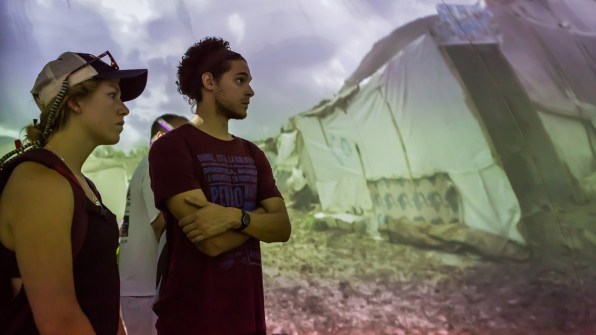Community, Leadership, Experimentation, Diversity, & Education
Pittsburgh Arts, Regional Theatre, New Work, Producing, Copyright, Labor Unions,
New Products, Coping Skills, J-O-Bs...
Theatre industry news, University & School of Drama Announcements, plus occasional course support for
Carnegie Mellon School of Drama Faculty, Staff, Students, and Alumni.
CMU School of Drama
Thursday, October 26, 2017
This VR Exhibit Lets You Witness The Refugee Crisis First Hand
Fast Company: Inside the dome at the entrance to “Forced from Home,” an interactive exhibit created by Doctors Without Borders/Médecins San Frontièrs (MSF), an image of the arid landscape around the border between Mexico and Guatemala fills the space; above, there’s a view of the sky scattered with clouds, and along one section of the dome, a wall painted with the phrase: ¡Bienvenidos migrantes! The scene shifts to the dining room of a hostel in Ixtepec, Oaxaca in southern Mexico, where Pedro, Diana, and their three children have just arrived after fleeing violence in their home country of Honduras. As Pedro and Diana alternate telling their story, the 360-degree view captures scenes of the hostel and the country around it, where they hope to make a new life for themselves.
Subscribe to:
Post Comments (Atom)

1 comment:
This is a fantastic project. I like the way they say, "closing the distance between what seems to be a very far-off problem." This is one of the greatest things that an immersive experience can do: bring out empathy. In high school, I studied the way mirror neurons work in entertainment. Mirror neurons are the little things in our brains that see people feeling things and replicate the feeling in ourselves by firing the same command for when you are actually experiencing it yourself. They're the reason why you wince when you see someone smack their shin against furniture, or why you feel very sad when you see someone else crying. Our brains naturally want to empathize with other people. In entertainment, this gets tricky. The less we register actors as people, the less we can understand and feel their pain, and so the less practice we get in empathy. In my thesis, I argued that live theatre was the closest we could get in entertainment to true human connection through entertainment and the ability to empathize with other stories. I still believe that, but I think entering a virtual reality in which the refugee crisis unfolds before your eyes, involving the "people" you have met in front of you and bringing you along for the journey is an almost equally effective tactic. It is extremely important with issues like this that we show the people who don't understand exactly what this looks like, so they can understand and empathize, and hopefully do their best to help the situation.
Post a Comment